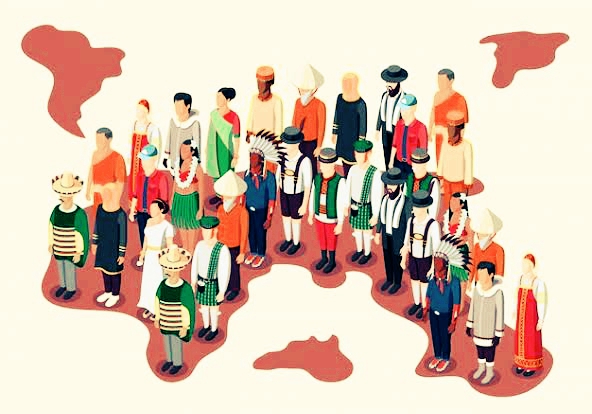
Colonialism has profoundly reshaped the world, leaving an permanent mark on the cultures, traditions and identities of indigenous peoples. The legacy of colonial rule is a story of disruption, displacement and cultural destruction but it is also an evidence to the elasticity and continuing spirit of indigenous peoples. This blog explores how colonialism reshaped indigenous cultures, the long-term effects of these transformations and the ongoing efforts to reclaim and regenerate cultural identities.
The Disruption of Traditional Ways of Life
Colonialism has brought dramatic changes to the traditional ways of life of indigenous peoples. Colonizers often imposed their own systems of governance, religion and economic practices which frequently clashed with and weakened existing indigenous structures.
Imposition of Foreign Systems
Colonial powers frequently introduced new political and legal systems that ignored indigenous governance structures. Traditional leaders and councils were often sidelined or replaced, disrupting long-standing methods of community decision-making and conflict resolution. This imposition of foreign systems not only undermined indigenous authority but also eroded traditional values and social cohesion.
Cultural Suppression
One of the most significant impacts of colonialism was the suppression of indigenous cultures and languages. Colonizers often viewed indigenous traditions and languages as inferior or primitive, leading to efforts to erase these cultural elements. Schools and missionary institutions played a key role in this process, often forbidding the use of native languages and punishing those who practiced traditional customs.
Economic Exploitation
Colonialism also altered indigenous economies. Traditional economies based on maintenance and collective sharing were disrupted by colonial economic practices that prioritized resource extraction and commercial exploitation. Indigenous lands were often appropriated for agriculture, mining or other industries, leading to displacement and loss of livelihood for many indigenous communities.
The Displacement and Marginalization of Indigenous Peoples
The effects of colonialism extended beyond cultural disruption to include physical displacement and systemic marginalization of indigenous peoples.
1. Land Dispossession
Colonial expansion often involved the seizure of indigenous lands. Treaties were frequently made under pressure or dishonesty, leading to the loss of vast territories. The displacement of indigenous peoples from their ancestral lands had severe repercussions, including the loss of traditional food sources, sacred sites and cultural heritage.
2. Social and Economic Marginalization
The introduction of colonial systems also led to the marginalization of indigenous peoples within their own societies. Economic inequalities were exacerbated as indigenous communities were often relegated to the peripheries of colonial economies. Social structures were disrupted, and indigenous peoples frequently faced discrimination and exclusion from political and economic opportunities.
The Resilience and Revival of Indigenous Cultures
Despite the profound impacts of colonialism, indigenous cultures have demonstrated remarkable resilience and adaptability. Efforts to reclaim, regenerate and preserve indigenous identities have gained momentum in recent decades.
1. Cultural Revitalization
Many indigenous communities are actively working to revive their languages, traditions, and practices that were suppressed during colonial rule. Language preservation programs, cultural festivals and traditional ceremonies are being revitalized to ensure that indigenous knowledge and practices are passed on to future generations. These efforts are not only a means of cultural preservation but also a way of strengthening community identity and pride.
2. Legal and Political Advocacy
Indigenous groups have increasingly engaged in legal and political advocacy to address historical injustices and reclaim rights to land and resources. Landmark legal victories and international agreements, such as the United Nations Declaration on the Rights of Indigenous Peoples (UNDRIP), have provided frameworks for recognizing and upholding indigenous rights. These efforts are crucial in addressing the ongoing impacts of colonialism and promoting justice and equality.
3. Empowerment and Self-Determination
Empowerment and self-determination are key to the ongoing revival of indigenous cultures. Indigenous-led organizations and movements are working to assert control over their own cultural, political and economic affairs. By fostering self-determination, indigenous peoples are better positioned to address the heritages of colonialism and shape their own futures.
Contemporary Implications
The legacy of colonialism continues to impact indigenous cultures today. Many indigenous communities still grapple with the effects of historical trauma, which can manifest in various social issues, including poverty, health disparities, and loss of cultural identity. Additionally, the fight for land rights and sovereignty remains a critical issue, as indigenous peoples seek to reclaim their ancestral territories and protect their cultural heritage from exploitation.
Social media, digital storytelling, and online education are enabling indigenous communities to share their stories, reclaim their narratives, and connect with a global audience. This digital renaissance allows for the preservation of languages, the sharing of traditional practices, and the promotion of cultural pride.
Conclusion
The impact of colonialism on indigenous cultures is a testament to both the destructive power of oppression and the enduring strength of cultural identity. While the scars of colonialism are still felt today, the resilience of indigenous peoples shines through in their ongoing efforts to preserve and revitalize their cultures. As we move forward, it is essential to acknowledge this history and work towards a future that honors and respects the richness of indigenous traditions and the contributions they make to our global cultural tapestry. By fostering understanding and solidarity, we can help create a more inclusive world that celebrates the diversity of human experience.









